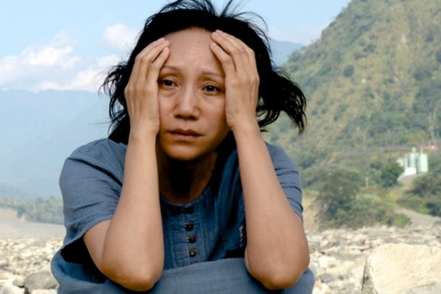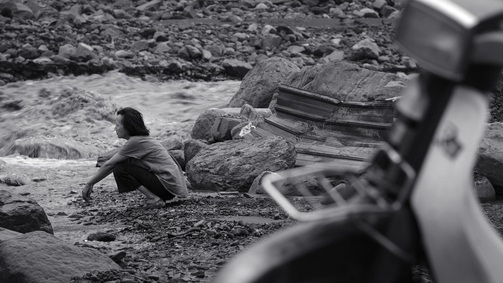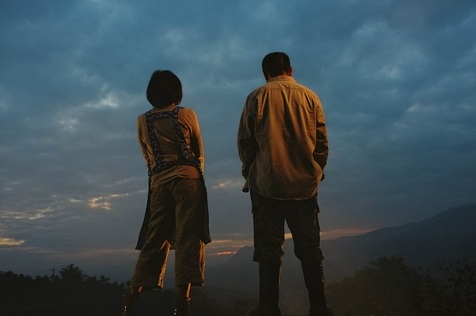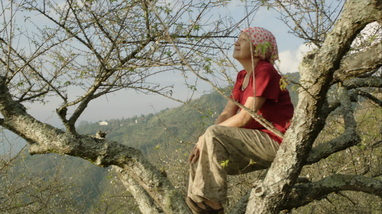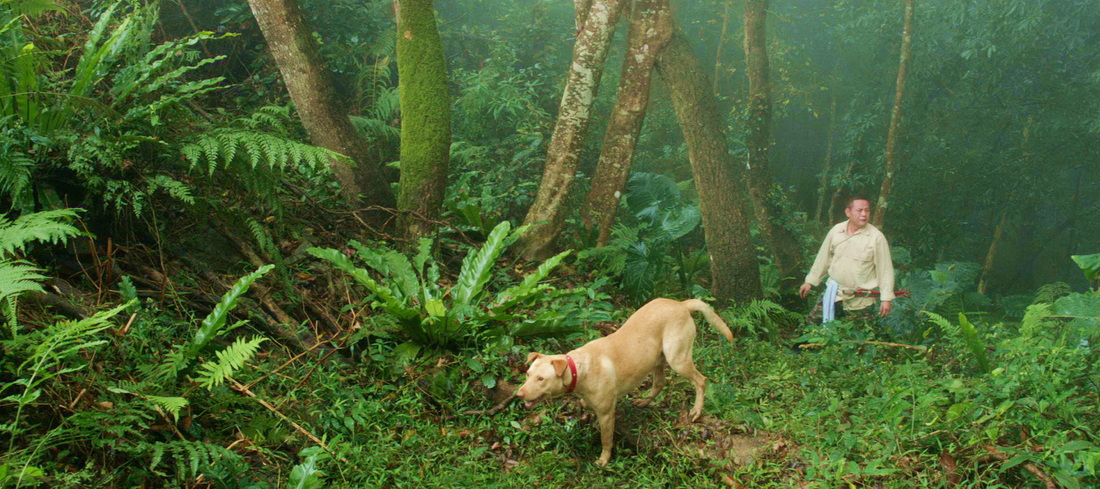《山豬溫泉》影評
Introducing Taiwanese Film to Canadian Audiences
New Canadian MediaThursday, 05 November 2015 10:25 原文網址
by Susan Korah in Ottawa
Like the Southeast Asian island nation itself, Taiwan’s film industry is small, and often overshadowed by international competitors. Despite its size, the industry and some of its talented directors deserve international recognition, says Tom McSorley, executive director of the Canadian Film Institute (CFI).
“Taiwan’s remarkably accomplished and varied cinema, both in terms of its superb craft and its thematic explorations of contemporary issues in modern Taiwanese society, deserves to be better known around the world,” says McSorley.
It’s with this in mind that the CFI is partnering with the Taipei Economic and Cultural Office (TECO) in Ottawa, which functions as the de facto embassy of Taiwan, to raise the profile of the country’s film industry in Canada.
The two organizations introduced over 200 people, mainly of Taiwanese and Chinese heritage, to The Boar King at Carleton University’s River Building Theatre last week.
“Taiwan’s remarkably accomplished and varied cinema deserves to be better known around the world.”
With a strong local flavour and scenes shot in the southern mountains of Taiwan, as well as in the capital city Taipei, the film dramatizes a story of loss, courage, resilience and hope in the face of tragedy.
Universal themes
The Boar King’s themes are universal, and in some respects, strongly reminiscent of the American classic Gone with the Wind, in which the heroine Scarlett O’Hara struggles to cope with the upheaval of the civil war.
The central character, Cho, loses her husband, Ying, in a typhoon that left their village in ruins. The grief-stricken widow is dealing with the prospect of losing her family business, since a landslide has buried the source of water for her hotel spa in the village.
As her fellow villagers desperately try to sell off their land and move out, they receive mysterious invitation cards from her deceased husband.
What secrets is he hiding, Cho and her daughter Fen wonder, as they try to find answers through videotapes he had left behind. The journey points the way to a new path that helps them let go of the past and find a new direction in life.
The character of the grandfather who refuses to accept the fact that his property value has not diminished even after a landslide provides comic relief.
“Her message is that life will always remain uncertain, but once you have hope, you will have faith and confidence for the future.”
Unlike stories with a ‘and so they lived happily ever after’ ending, The Boar King concludes with Cho walking into a still uncertain future.
“This was deliberate,” Frank Lin, Taiwan’s acting representative in Ottawa, tells New Canadian Media. “Director Chen Ti Kuo is known for her documentaries and brings a strong note of realism even to her fictional movies. Her message is that life will always remain uncertain, but once you have hope, you will have faith and confidence for the future.”
High calibre of directing
In The Boar King the past is depicted in stunning coloured shots emerging from the video left behind by Cho’s husband, while the present scenes of destruction and desolation are portrayed in black and white scenes.
“This is a deliberate technique used by the director to emphasize the contrast between their past and present lives, and is not a problem with the equipment,” Lin said when introducing the film at the screening, drawing a laugh from the audience.
“Compared to the dream and memory sequences, the present seems harsh and bitter,” said Kuo, at an earlier screening in Montreal. “But when a brightly coloured butterfly flies and crosses over into the black and white reality, the boundary between the dream and reality is blurred and the woman starts to walk into the future.”
“A movie by Hou Hsiao-Hsien invariably features sparse dialogue, muted colors, passions held in check, and a deeply aesthetic feel.”
As McSorley points out there are many young and talented directors coming out of Taiwan, and Kuo appears to be one of them.
Her work follows in the steps of Taiwanese director Ang Lee, who was behind Life of Pii, the 2012 adventure drama starring Indian actors Suraj Sharma and Irrfan Khan, as well as director Hou Hsiao-Hsien who won the Best Director award at the 2015 Cannes Film Festival for The Assassin.
Lin illustrates this by referencing The Boar King’s sparse dialogue – in Taiwanese, with English and Mandarin Chinese subtitles – which is offset through the use of body language and facial expressions that portray a range of emotions from anger and despair to gradually emerging hope.
“A movie by Hou Hsiao-Hsien invariably features sparse dialogue, muted colors, passions held in check, and a deeply aesthetic feel,” says Lin.
What this film initiative, CFI and TECO aim to showcase that Taiwan dramas offer an alternative to the blockbuster movies of Hollywood and Bollywood that often produce purely escapist entertainment.
“Taiwanese directors turn normal, regular lives into art,” explains Lin. “It is the reason why we introduce Taiwanese films to our Canadian friends.”
by Susan Korah in Ottawa
Like the Southeast Asian island nation itself, Taiwan’s film industry is small, and often overshadowed by international competitors. Despite its size, the industry and some of its talented directors deserve international recognition, says Tom McSorley, executive director of the Canadian Film Institute (CFI).
“Taiwan’s remarkably accomplished and varied cinema, both in terms of its superb craft and its thematic explorations of contemporary issues in modern Taiwanese society, deserves to be better known around the world,” says McSorley.
It’s with this in mind that the CFI is partnering with the Taipei Economic and Cultural Office (TECO) in Ottawa, which functions as the de facto embassy of Taiwan, to raise the profile of the country’s film industry in Canada.
The two organizations introduced over 200 people, mainly of Taiwanese and Chinese heritage, to The Boar King at Carleton University’s River Building Theatre last week.
“Taiwan’s remarkably accomplished and varied cinema deserves to be better known around the world.”
With a strong local flavour and scenes shot in the southern mountains of Taiwan, as well as in the capital city Taipei, the film dramatizes a story of loss, courage, resilience and hope in the face of tragedy.
Universal themes
The Boar King’s themes are universal, and in some respects, strongly reminiscent of the American classic Gone with the Wind, in which the heroine Scarlett O’Hara struggles to cope with the upheaval of the civil war.
The central character, Cho, loses her husband, Ying, in a typhoon that left their village in ruins. The grief-stricken widow is dealing with the prospect of losing her family business, since a landslide has buried the source of water for her hotel spa in the village.
As her fellow villagers desperately try to sell off their land and move out, they receive mysterious invitation cards from her deceased husband.
What secrets is he hiding, Cho and her daughter Fen wonder, as they try to find answers through videotapes he had left behind. The journey points the way to a new path that helps them let go of the past and find a new direction in life.
The character of the grandfather who refuses to accept the fact that his property value has not diminished even after a landslide provides comic relief.
“Her message is that life will always remain uncertain, but once you have hope, you will have faith and confidence for the future.”
Unlike stories with a ‘and so they lived happily ever after’ ending, The Boar King concludes with Cho walking into a still uncertain future.
“This was deliberate,” Frank Lin, Taiwan’s acting representative in Ottawa, tells New Canadian Media. “Director Chen Ti Kuo is known for her documentaries and brings a strong note of realism even to her fictional movies. Her message is that life will always remain uncertain, but once you have hope, you will have faith and confidence for the future.”
High calibre of directing
In The Boar King the past is depicted in stunning coloured shots emerging from the video left behind by Cho’s husband, while the present scenes of destruction and desolation are portrayed in black and white scenes.
“This is a deliberate technique used by the director to emphasize the contrast between their past and present lives, and is not a problem with the equipment,” Lin said when introducing the film at the screening, drawing a laugh from the audience.
“Compared to the dream and memory sequences, the present seems harsh and bitter,” said Kuo, at an earlier screening in Montreal. “But when a brightly coloured butterfly flies and crosses over into the black and white reality, the boundary between the dream and reality is blurred and the woman starts to walk into the future.”
“A movie by Hou Hsiao-Hsien invariably features sparse dialogue, muted colors, passions held in check, and a deeply aesthetic feel.”
As McSorley points out there are many young and talented directors coming out of Taiwan, and Kuo appears to be one of them.
Her work follows in the steps of Taiwanese director Ang Lee, who was behind Life of Pii, the 2012 adventure drama starring Indian actors Suraj Sharma and Irrfan Khan, as well as director Hou Hsiao-Hsien who won the Best Director award at the 2015 Cannes Film Festival for The Assassin.
Lin illustrates this by referencing The Boar King’s sparse dialogue – in Taiwanese, with English and Mandarin Chinese subtitles – which is offset through the use of body language and facial expressions that portray a range of emotions from anger and despair to gradually emerging hope.
“A movie by Hou Hsiao-Hsien invariably features sparse dialogue, muted colors, passions held in check, and a deeply aesthetic feel,” says Lin.
What this film initiative, CFI and TECO aim to showcase that Taiwan dramas offer an alternative to the blockbuster movies of Hollywood and Bollywood that often produce purely escapist entertainment.
“Taiwanese directors turn normal, regular lives into art,” explains Lin. “It is the reason why we introduce Taiwanese films to our Canadian friends.”
After the storm Kuo Chen-ti’s latest film looks at loss, pain and healing through a touching story inspired by Typhoon Morakot.
TAIPEI TIMES By Ho Yi / Staff reporter / 原文網址
Grief and healing take central stage in Kuo Chen-ti’s (郭珍弟) new film, The Boar King (山豬溫泉), which tells a deceptively quiet story of loss and rebirth inspired by the traumatic events when Typhoon Morakot devastated southern Taiwan in 2009. While it could have easily been made into a work of lachrymose sentimentality, the film thankfully doesn’t go in that direction. Instead, it looks at human suffering and pain with considerable restraint, buttressed by solid performances of Lu Yi-ching (陸弈靜) and Tsai Chen-nan (蔡振南).
Set in Baolai (寶來) in Greater Kaohsiung’s Liouguei Township (六龜), the film opens with home video footage of torrential flooding caused by Typhoon Morakot, as the off-screen cameraman witnesses the catastrophe in awe. The man’s name is Ying — played by Chen Mu-i (陳慕義) — who later disappears.
The widowed wife, Cho (Lu Yi-ching, 陸弈靜), is left with a hot spring lodge that barely survives the disaster. Seized by despair, Cho attempts and fails to commit suicide, having thought of her responsibility for Ying’s senile father, who lives with her. One day, Ying’s close friend Nan (Tsai Chen-nan, 蔡振南), a hunter, shows up at Cho’s door, offering to help rebuild the mountain inn. A reticent man, Nan has kept his tender feeling toward Cho for years.
Ying’s death also brings back Cho’s step-daughter Fen (Wu I-ting, 吳伊婷), who works mundane jobs in the city. Amid grief, she meets land surveyor Garmin, played by Soda Voyu from Seediq Bale (賽德克巴萊), and love starts to bud between the two.
Meanwhile, the villagers are forced to leave the devastated area, selling their homes to a resort development company. But one by one, they receive invitations sent by Ying before he died to a banquet set to be held at the inn. Perplexed, Cho looks to the home videos shot by her late husband, hoping to unravel the secret of his death.
Five years after her less than satisfactory debut feature Step by Step (練戀舞), Kuo has returned here with a finely executed and honest work filled with lyrical moments. The polished cinematography by Paotao (寶島) allows for the full expression of nature, whether a collapsed mountain slope, a riverbed studded with massive rocks, lush woods and hidden trails.
At times, sequences from the home videos shot by Chen’s character are inserted in and fused with the present narration, not only providing clues to the man’s thinking and his mysterious disappearance, but serving a link that enables the living to search for and reconnect with the dead and to come to terms with their grief.
The daughter’s reconnection with her father also raises the issue of land and homecoming. “The mountain road to home is no longer obstructed, don’t you think?” she says to her lover. However, much of the film’s failing lies in its rather flaccid effort to explore the young woman’s transformation. Her off-screen narration appears superfluous, adding nothing significant to the story, and theater actress Wu delivers the role with punctuated intensity that sometimes belongs to the stage rather than in front of the camera.
The crowning moments in The Boar King ultimately belong to veteran thespians Lu and Tsai. In a scene toward the end, Nan recounts an unforgettable encounter with a wild boar to Cho. We follow Nan’s resonant voice into the woods, where hot spring water flows, lives are intertwined and life quietly goes on.
Grief and healing take central stage in Kuo Chen-ti’s (郭珍弟) new film, The Boar King (山豬溫泉), which tells a deceptively quiet story of loss and rebirth inspired by the traumatic events when Typhoon Morakot devastated southern Taiwan in 2009. While it could have easily been made into a work of lachrymose sentimentality, the film thankfully doesn’t go in that direction. Instead, it looks at human suffering and pain with considerable restraint, buttressed by solid performances of Lu Yi-ching (陸弈靜) and Tsai Chen-nan (蔡振南).
Set in Baolai (寶來) in Greater Kaohsiung’s Liouguei Township (六龜), the film opens with home video footage of torrential flooding caused by Typhoon Morakot, as the off-screen cameraman witnesses the catastrophe in awe. The man’s name is Ying — played by Chen Mu-i (陳慕義) — who later disappears.
The widowed wife, Cho (Lu Yi-ching, 陸弈靜), is left with a hot spring lodge that barely survives the disaster. Seized by despair, Cho attempts and fails to commit suicide, having thought of her responsibility for Ying’s senile father, who lives with her. One day, Ying’s close friend Nan (Tsai Chen-nan, 蔡振南), a hunter, shows up at Cho’s door, offering to help rebuild the mountain inn. A reticent man, Nan has kept his tender feeling toward Cho for years.
Ying’s death also brings back Cho’s step-daughter Fen (Wu I-ting, 吳伊婷), who works mundane jobs in the city. Amid grief, she meets land surveyor Garmin, played by Soda Voyu from Seediq Bale (賽德克巴萊), and love starts to bud between the two.
Meanwhile, the villagers are forced to leave the devastated area, selling their homes to a resort development company. But one by one, they receive invitations sent by Ying before he died to a banquet set to be held at the inn. Perplexed, Cho looks to the home videos shot by her late husband, hoping to unravel the secret of his death.
Five years after her less than satisfactory debut feature Step by Step (練戀舞), Kuo has returned here with a finely executed and honest work filled with lyrical moments. The polished cinematography by Paotao (寶島) allows for the full expression of nature, whether a collapsed mountain slope, a riverbed studded with massive rocks, lush woods and hidden trails.
At times, sequences from the home videos shot by Chen’s character are inserted in and fused with the present narration, not only providing clues to the man’s thinking and his mysterious disappearance, but serving a link that enables the living to search for and reconnect with the dead and to come to terms with their grief.
The daughter’s reconnection with her father also raises the issue of land and homecoming. “The mountain road to home is no longer obstructed, don’t you think?” she says to her lover. However, much of the film’s failing lies in its rather flaccid effort to explore the young woman’s transformation. Her off-screen narration appears superfluous, adding nothing significant to the story, and theater actress Wu delivers the role with punctuated intensity that sometimes belongs to the stage rather than in front of the camera.
The crowning moments in The Boar King ultimately belong to veteran thespians Lu and Tsai. In a scene toward the end, Nan recounts an unforgettable encounter with a wild boar to Cho. We follow Nan’s resonant voice into the woods, where hot spring water flows, lives are intertwined and life quietly goes on.
內斂而不沈悶,真的很厲害!
撰文│王昭文 原文網址
4月14日特地奔去高雄看「山豬溫泉」。很值得。非常好看!
單是看六龜的山和荖濃溪,朝霞、雲影,就已經夠感動。而在這梅子採收的季節,看見片子一開始的梅樹林,也頗有感觸。
重要的是,劇本寫得相當好,演員又出色,加上令人欽佩的攝影手法,是一齣質地細緻、動人心弦的好電影。沒有我最怕的文藝腔,也沒有誇張的鄉土劇模式,內斂而不沈悶,真的很厲害!
故事是關於如何面對死亡、失去,走出憂傷困頓,釋然的過程。旁及溫泉鄉災後的困境:大部分人出走、財團趁機收購土地、黑白兩道聯手逼渴望自由自在的人屈服、官僚體系帶來的是更多困擾不是幫助、撿拾木材算侵占國有財產等等,都點到為止。電影是幾位主角的生活切片,他們不只活在電影中,生活還在繼續,觀眾似乎受邀繼續編寫他們的故事。
寶來溫泉區在電影中很迷人,讓人很想再去走走。還有Garmin衛星導航在片中也軋了一角,頗重要喔。此電影的置入性行銷,很高明,很優!
最近是最後的院線檔期了。只有台北威秀和高雄威秀有放映,高雄放映到下禮拜二。請趕快把握機會。很值得看,真的!
撰文│王昭文 原文網址
4月14日特地奔去高雄看「山豬溫泉」。很值得。非常好看!
單是看六龜的山和荖濃溪,朝霞、雲影,就已經夠感動。而在這梅子採收的季節,看見片子一開始的梅樹林,也頗有感觸。
重要的是,劇本寫得相當好,演員又出色,加上令人欽佩的攝影手法,是一齣質地細緻、動人心弦的好電影。沒有我最怕的文藝腔,也沒有誇張的鄉土劇模式,內斂而不沈悶,真的很厲害!
故事是關於如何面對死亡、失去,走出憂傷困頓,釋然的過程。旁及溫泉鄉災後的困境:大部分人出走、財團趁機收購土地、黑白兩道聯手逼渴望自由自在的人屈服、官僚體系帶來的是更多困擾不是幫助、撿拾木材算侵占國有財產等等,都點到為止。電影是幾位主角的生活切片,他們不只活在電影中,生活還在繼續,觀眾似乎受邀繼續編寫他們的故事。
寶來溫泉區在電影中很迷人,讓人很想再去走走。還有Garmin衛星導航在片中也軋了一角,頗重要喔。此電影的置入性行銷,很高明,很優!
最近是最後的院線檔期了。只有台北威秀和高雄威秀有放映,高雄放映到下禮拜二。請趕快把握機會。很值得看,真的!
導演溫柔浪漫的觀點 感受影片所傳達的正面能量
撰文│翁文進 原文網址
我在2003年看過目前正在華納威秀上演的《山豬溫泉》這部片的郭珍弟導演的作品 -《跳舞時代》, 這個片子點出可以界定出台語流行歌曲的第一首作品,讓我身為一個喜愛音樂的人,能了解台語歌曲的里程碑,讓我能自豪的在中國內地的客人面前,提到台語流行歌曲的身份地位,觀賞這部片,比我看過任何一場舞台劇或音樂會更感動.這一次期待⋯⋯郭導演用謹慎細膩的眼光,用一段兩小時的電影,帶觀眾走入,如八八風災這樣自然災害受創災民的心境, 再如何用影像故事讓觀影的人隨故事中的人物,及導演溫柔浪漫的觀點,感受影片所傳達的正面能量,我想這部片有點像女性版的KANO,自然不造作的內容,溫柔而精準的傳達影像的感染力。我在2003年看過目前正在華納威秀上演的《山豬溫泉》這部片的郭珍弟導演的作品 -《跳舞時代》, 這個片子點出可以界定出台語流行歌曲的第一首作品,讓我身為一個喜愛音樂的人,能了解台語歌曲的里程碑,讓我能自豪的在中國內地的客人面前,提到台語流行歌曲的身份地位,觀賞這部片,比我看過任何一場舞台劇或音樂會更感動.這一次期待⋯⋯郭導演用謹慎細膩的眼光,用一段兩小時的電影,帶觀眾走入,如八八風災這樣自然災害受創災民的心境, 再如何用影像故事讓觀影的人隨故事中的人物,及導演溫柔浪漫的觀點,感受影片所傳達的正面能量,我想這部片有點像女性版的KANO,自然不造作的內容,溫柔而精準的傳達影像的感染力。
撰文│翁文進 原文網址
我在2003年看過目前正在華納威秀上演的《山豬溫泉》這部片的郭珍弟導演的作品 -《跳舞時代》, 這個片子點出可以界定出台語流行歌曲的第一首作品,讓我身為一個喜愛音樂的人,能了解台語歌曲的里程碑,讓我能自豪的在中國內地的客人面前,提到台語流行歌曲的身份地位,觀賞這部片,比我看過任何一場舞台劇或音樂會更感動.這一次期待⋯⋯郭導演用謹慎細膩的眼光,用一段兩小時的電影,帶觀眾走入,如八八風災這樣自然災害受創災民的心境, 再如何用影像故事讓觀影的人隨故事中的人物,及導演溫柔浪漫的觀點,感受影片所傳達的正面能量,我想這部片有點像女性版的KANO,自然不造作的內容,溫柔而精準的傳達影像的感染力。我在2003年看過目前正在華納威秀上演的《山豬溫泉》這部片的郭珍弟導演的作品 -《跳舞時代》, 這個片子點出可以界定出台語流行歌曲的第一首作品,讓我身為一個喜愛音樂的人,能了解台語歌曲的里程碑,讓我能自豪的在中國內地的客人面前,提到台語流行歌曲的身份地位,觀賞這部片,比我看過任何一場舞台劇或音樂會更感動.這一次期待⋯⋯郭導演用謹慎細膩的眼光,用一段兩小時的電影,帶觀眾走入,如八八風災這樣自然災害受創災民的心境, 再如何用影像故事讓觀影的人隨故事中的人物,及導演溫柔浪漫的觀點,感受影片所傳達的正面能量,我想這部片有點像女性版的KANO,自然不造作的內容,溫柔而精準的傳達影像的感染力。
傷口,不一定要療癒
撰文│何靜茹 原文網址
若說這是部療癒的電影,可能還不夠精確。 以莫拉克風災為故事起源,導演郭珍弟在處理「傷痛」時,沒有讓電影套入「面對它接受 它處理它放下它」的感人公式, 而是溫柔去訴說,做為一個有限的存在,我們會有怯懦、有無奈、有猶疑,不見得時時刻 刻都能理性思考,做出的選擇也不一定能解決當下的困境。 我們常以為有傷口就一定要治療,這才是勇敢的表現。 但受傷其實沒什麼了不起的,做為一個有血有肉的人,我們究竟要努力地讓自己保持完整如初?還是帶著滿身傷痕活下去?《山豬溫泉》提出了這樣的思考。 這是部值得進電影院觀看的好電影,只是沉靜的調性,不容易在此時被看見。 我想起了好久好久以前看過的《戀戀風塵》,那時也是感到有些索然無聊。但電影的威力 卻在數年後慢慢發酵。 原來,人生就是這麼一回事。不一定是饒富轉折,它如常地行進著,但我們卻在時間的流 逝中,一點一滴長成了自己的樣子。若說這是部療癒的電影,可能還不夠精確。 以莫拉克風災為故事起源,導演郭珍弟在處理「傷痛」時,沒有讓電影套入「面對它接受 它處理它放下它」的感人公式, 而是溫柔去訴說,做為一個有限的存在,我們會有怯懦、有無奈、有猶疑,不見得時時刻 刻都能理性思考,做出的選擇也不一定能解決當下的困境。 我們常以為有傷口就一定要治療,這才是勇敢的表現。 但受傷其實沒什麼了不起的,做為一個有血有肉的人,我們究竟要努力地讓自己保持完整如初?還是帶著滿身傷痕活下去?《山豬溫泉》提出了這樣的思考。 這是部值得進電影院觀看的好電影,只是沉靜的調性,不容易在此時被看見。 我想起了好久好久以前看過的《戀戀風塵》,那時也是感到有些索然無聊。但電影的威力 卻在數年後慢慢發酵。 原來,人生就是這麼一回事。不一定是饒富轉折,它如常地行進著,但我們卻在時間的流 逝中,一點一滴長成了自己的樣子。
撰文│何靜茹 原文網址
若說這是部療癒的電影,可能還不夠精確。 以莫拉克風災為故事起源,導演郭珍弟在處理「傷痛」時,沒有讓電影套入「面對它接受 它處理它放下它」的感人公式, 而是溫柔去訴說,做為一個有限的存在,我們會有怯懦、有無奈、有猶疑,不見得時時刻 刻都能理性思考,做出的選擇也不一定能解決當下的困境。 我們常以為有傷口就一定要治療,這才是勇敢的表現。 但受傷其實沒什麼了不起的,做為一個有血有肉的人,我們究竟要努力地讓自己保持完整如初?還是帶著滿身傷痕活下去?《山豬溫泉》提出了這樣的思考。 這是部值得進電影院觀看的好電影,只是沉靜的調性,不容易在此時被看見。 我想起了好久好久以前看過的《戀戀風塵》,那時也是感到有些索然無聊。但電影的威力 卻在數年後慢慢發酵。 原來,人生就是這麼一回事。不一定是饒富轉折,它如常地行進著,但我們卻在時間的流 逝中,一點一滴長成了自己的樣子。若說這是部療癒的電影,可能還不夠精確。 以莫拉克風災為故事起源,導演郭珍弟在處理「傷痛」時,沒有讓電影套入「面對它接受 它處理它放下它」的感人公式, 而是溫柔去訴說,做為一個有限的存在,我們會有怯懦、有無奈、有猶疑,不見得時時刻 刻都能理性思考,做出的選擇也不一定能解決當下的困境。 我們常以為有傷口就一定要治療,這才是勇敢的表現。 但受傷其實沒什麼了不起的,做為一個有血有肉的人,我們究竟要努力地讓自己保持完整如初?還是帶著滿身傷痕活下去?《山豬溫泉》提出了這樣的思考。 這是部值得進電影院觀看的好電影,只是沉靜的調性,不容易在此時被看見。 我想起了好久好久以前看過的《戀戀風塵》,那時也是感到有些索然無聊。但電影的威力 卻在數年後慢慢發酵。 原來,人生就是這麼一回事。不一定是饒富轉折,它如常地行進著,但我們卻在時間的流 逝中,一點一滴長成了自己的樣子。
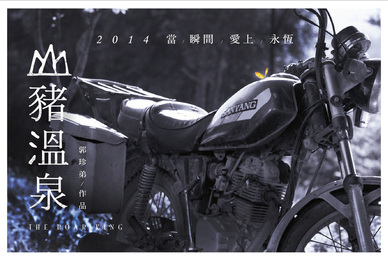
別被片名嚇著
其實很有意思
撰文│鄭秉泓 原文網址
關於《山豬溫泉》。大家別被這個片名嚇著,其實是很有意思的片子。比方有個長得像林志玲的女生假如叫林素珠,你光看名字就打回票,豈不是錯過了機會...
一、假如《kano》才是真正「看見台灣」,那麼《山豬溫泉》才是真正「拔一條河」。我很訝異,拍莫拉克,卻選擇用那麼節制的方式加以呈現,沒有一絲廉價的操弄,也沒有意圖明顯的狗血。
二、大概因為攝影師是寶島的關係,《山豬溫泉》的影像感很不錯,我本來很擔心會是像 多數公視人生劇展那樣有企圖有誠意但「不夠電影」的小品,完全不會!寶島拍山林青蔥縹緲的氣氛真是一絕!把綠拍出了層次與意境!
三、《山豬溫泉》有點像去年高雄電影館演的《大鹿村騷動記》(阪本順治導),表面上 有情有愛有恨有騷動,但真正的核心是關於土地,關於世代妥協,關於回家(仍是非常直 承新電影的「回家」「歸鄉」命題)。不過,《山豬溫泉》把回家這件事情說得很有意思 ,不是很多通俗劇那樣的回家做做樣子SHORT STAY後得到能量重返都市,不是什麼城市OL 另闢蹊徑用新方式改革農村的老哏,《山豬溫泉》用非常質樸的方式尋根,讓過去的父親與現在的自己對話,讓莫拉克之前的地景與災後的地景對話。《山豬溫泉》是關於回家, 也關於尋根與再出發,以一種非常療癒但不庸俗的方式,它跟去年雄影開幕片《很久沒有 敬我了你》(吳米森導,帶著詩意的鄉土卡通喜劇)、觀摩片《廢物》(樓一安導,非常 黑色喜劇的鄉土劇)簡直是三胞胎,我覺得這三部片簡直是我心中台灣最最最缺乏的,貨 真價實的鄉土劇(達到了《不倒翁的奇幻旅程》與《白日的星星》無法做到的事)。以戲 劇創作的方式展現對於這片土地的關懷,而且這三部片的幕前幕後卡司其實有互通支援耶 。
四、最早接觸《山豬溫泉》,是當年還叫作「肥田出租」時期,那時那個故事比較偏偶像 劇,幸好最後整個改掉了,現在這個故事講家的重建與心靈的重建,重生的意象與溫泉的熱流與愛情的萌芽與山豬的精神象徵,擺在一起很有意思。蔡振南在故事尾聲對著陸弈靜講山豬的故事那段,簡直是神來之筆,非常完美的表演,就像《險路勿近》最後湯米李瓊斯對著觀眾說夢那段一樣精彩。
五、當然《山豬溫泉》不無缺點,首尾女主角吳伊婷的獨白太多餘太出戲應該全刪;女主 角在城市受挫那段回憶太突兀應該可以轉個彎或根本無庸交待,前半小時有點太拖應該剪得再緊湊些。不過相較於郭珍弟前作《練戀舞》,我覺得這回她找到了一個比較對的方向 ,同樣具有人文思維與土地關懷,但不刻意再去走偶像劇路線,而且融入了自己所擅長的紀錄片元素,裡頭群眾演員的素人表演很不錯,利用陳慕義飾演的父親生前大量拍攝的 HOME VIDEO去牽動劇情,雖然我覺得某些時刻有點多餘,但不可否認這樣的今昔對話,到了最後把整個線索串了起來,動人的力量還是有出來。山豬與溫泉的視覺與精神象徵也有凸顯出來。
六、蘇達自從《賽德克.巴萊》以後終於演到一個比較可愛的角色,之前他在《命運狗不理》跟《天台》根本被糟蹋,《真愛100天》那個憨厚鄉村郎又缺乏存在感,這回在《山豬》裡頭還是演個憨男,但總算有幫他寫了幾段有發揮的戲。 六、蘇達自從《賽德克.巴萊》以後終於演到一個比較可愛的角色,之前他在《命運狗不理》跟《天台》根本被糟蹋,《真愛100天》那個憨厚鄉村郎又缺乏存在感,這回在《山豬》裡頭還是演個憨男,但總算有幫他寫了幾段有發揮的戲。
山豬溫泉-誠懇探索什麼是台灣的美
撰文│曾俊銘 原文網址
小弟上禮拜有幸參與朋友的 太座 執導的電影《山豬溫泉》試映,令人感動的一部片,嗚嗚嗚嗚嗚嗚嗚嗚嗚嗚嗚嗚,在此推薦給諸君。
說到所謂 國片,其實很想從純美學觀點去觀之,無奈自身台灣民族主義心態作祟,總是想放在台灣的脈絡下看看,嗚嗚嗚嗚嗚嗚,印象中諸如 大稻埕、總鋪師、機牌英雄之類的片子,總不免讓人感到,似乎將所謂 “本土” 的刻板印象、偏庶民美學的元素,弄成好像 “不是我身邊的、新奇的事物” ,放在比較 “台北人” 懂得的美學框架中販賣出去(好模擬兩可的一段感覺文字(茶)),但,《山豬溫泉》這部片,我覺得我看到某種不同的美學觀點,跟呈現方式,不過我好詞窮,應該這麼說,他似乎是很誠懇的不妄加評論的、不刻意創造出 “很台灣” 的人事物、場景,好像,其實那些人事物、場景,本就存於我們身旁,導演僅是運用他的鏡框,框出他觀點下的 “美” (感覺有點像紀錄片的邏輯),只的不單單是技術上來講畫面很美,還⋯⋯有其它,人情感部分之類的...
當社會上好像彌漫一股失敗主義、犬儒主義時,看看這種根植台灣,誠懇探索什麼是台灣的美、真正踩在土地上辛苦耕耘創作、有溫度、不虛華、但也沒偏到只有感恩惜福的劇情片創作,應當會帶給人一點力量吧!
《山豬溫泉》
導演|郭珍弟 編劇|郭珍弟 演員|陸弈靜 蔡振南 陳慕義 吳伊婷
官方臉書粉絲團 │ 三餘書店推文
撰文│曾俊銘 原文網址
小弟上禮拜有幸參與朋友的 太座 執導的電影《山豬溫泉》試映,令人感動的一部片,嗚嗚嗚嗚嗚嗚嗚嗚嗚嗚嗚嗚,在此推薦給諸君。
說到所謂 國片,其實很想從純美學觀點去觀之,無奈自身台灣民族主義心態作祟,總是想放在台灣的脈絡下看看,嗚嗚嗚嗚嗚嗚,印象中諸如 大稻埕、總鋪師、機牌英雄之類的片子,總不免讓人感到,似乎將所謂 “本土” 的刻板印象、偏庶民美學的元素,弄成好像 “不是我身邊的、新奇的事物” ,放在比較 “台北人” 懂得的美學框架中販賣出去(好模擬兩可的一段感覺文字(茶)),但,《山豬溫泉》這部片,我覺得我看到某種不同的美學觀點,跟呈現方式,不過我好詞窮,應該這麼說,他似乎是很誠懇的不妄加評論的、不刻意創造出 “很台灣” 的人事物、場景,好像,其實那些人事物、場景,本就存於我們身旁,導演僅是運用他的鏡框,框出他觀點下的 “美” (感覺有點像紀錄片的邏輯),只的不單單是技術上來講畫面很美,還⋯⋯有其它,人情感部分之類的...
當社會上好像彌漫一股失敗主義、犬儒主義時,看看這種根植台灣,誠懇探索什麼是台灣的美、真正踩在土地上辛苦耕耘創作、有溫度、不虛華、但也沒偏到只有感恩惜福的劇情片創作,應當會帶給人一點力量吧!
《山豬溫泉》
導演|郭珍弟 編劇|郭珍弟 演員|陸弈靜 蔡振南 陳慕義 吳伊婷
官方臉書粉絲團 │ 三餘書店推文
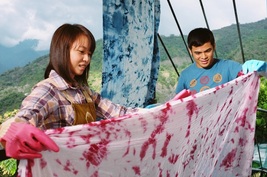
失去的,會再回暖:
山豬溫泉的女性視角。
撰文│徐敏思 原文網址
台灣電影經歷了2000年的一片慘澹,魏德聖和九把刀相繼加入戰局,帶入新的電影編制和媒體行銷策略,商業電影嶄露頭角,漸趨穩固。而去年呼聲很高的紀錄片「看見台灣」也為非主流電影打了一劑強心針,國片的腳步又開始輕盈起來。在KANO的棒球熱血,以及強勁的媒體宣傳下,有一部璞實溫婉、但充滿誠意的電影,山豬溫泉,默默地上映了。
不同於KANO用高潮迭起的熱血敘事來包裝國族意識和歷史辯證的企圖,山豬溫泉的故事簡單,用鏡頭和場景刻畫在水災之後,山區居民的日常。拋卻大歷史敘事的包袱,也拋卻居住正義和國土規劃,郭珍弟用冷靜和青澀的鏡頭反覆交錯,旁觀這些山裡的人,如何面對失去,再次擁抱生活。
有人說,看來像是在延續台灣新電影的寫實傳統。確實,鏡頭美學可以看出某種侯孝賢的影子,但我看到更多的是,在敘事的切換上,郭珍弟導演的原創。
電影一開場,青澀的手持鏡頭,兩個女主角出現了,爸爸的女朋友美雀與女兒阿芬,旁白是阿芬的聲音。是誰站在鏡頭後方呢?原來是在水災後消失無蹤的爸爸。家裡只剩下阿公、美雀和阿芬三個人了。
一個創傷的開始,生活該如何繼續?生命仿佛都失卻了意義。阿芬出走,美雀如同行屍走肉,失智的阿公勉強維持住美雀的生活與行動,一個唯一沒有煩惱的人,在時間之外,隱隱地提醒我們,活著,就只是活著,不需要太多詮釋。美雀留了下來,男友的好友正男總是過來探望。但美雀還是得面對生計、土地所有權、以及男友留下的派對喜筵,和一卷又一卷的DV帶。
像偵探一樣,從男友留下的蛛絲馬跡,拼湊出生活的意義。她從無感到悲傷,從悲傷到憤怒,到終於可以諒解,這之中的剪接節奏,細膩且溫柔,瑣碎但完整。不是一面倒地鋪陳美雀的生命情境之變化,而是透過人與人的變換與出場,散落地呈現整體,阿芬與Garmin少年的戀情,阿公的天真,正男為著生計而搏鬥,黑仔的土地收購行動,一環扣著一環,人與人之間的連結引動情緒,時而悲傷,時而沈默,時而痛苦,時而溫暖。
我們總是在兩極之間擺盪著,愛與恨之間,生與死之間,封閉與連結之間,寂寞與單獨之間,當我們總是能回到生命本然的節奏,觀照著呼吸的一進一出,關照著別人同時也關照著自己,時間的魔法喚起療癒的力量,我們逐漸長出能力,不再緊抓著那些不能回答的反覆叩問,而後終能放手。
這是一部關於失去的電影。人如何面對失去,在失去中,找到力量。
和台灣新電影最大的不同是,郭珍弟導演並不把焦點擺在大環境的動盪,人如何背負著難解的歷史包袱,環境氛圍如何壓迫或扭曲人的存在。她所設定的角色人物,都超越了環境的限制,每一個角色,在生活的小確幸下,用力地以他自己的方式生存下來,和環境搏鬥或和解。與其著墨在災區生活如何艱困,郭珍弟把重心擺在,每一個人,都會用他的方式,找到出路。環境的變化成為舉重若輕的背景,而不再是不可承受之重。
與其說山豬溫泉走回台灣寫實主義的傳統,不如說,山豬溫泉呼應了台灣寫實主義傳統,以女性幽微散落、側重情感發展的剪接敘事,開拓台灣寫實主義的新面向。
山豬溫泉的女性視角。
撰文│徐敏思 原文網址
台灣電影經歷了2000年的一片慘澹,魏德聖和九把刀相繼加入戰局,帶入新的電影編制和媒體行銷策略,商業電影嶄露頭角,漸趨穩固。而去年呼聲很高的紀錄片「看見台灣」也為非主流電影打了一劑強心針,國片的腳步又開始輕盈起來。在KANO的棒球熱血,以及強勁的媒體宣傳下,有一部璞實溫婉、但充滿誠意的電影,山豬溫泉,默默地上映了。
不同於KANO用高潮迭起的熱血敘事來包裝國族意識和歷史辯證的企圖,山豬溫泉的故事簡單,用鏡頭和場景刻畫在水災之後,山區居民的日常。拋卻大歷史敘事的包袱,也拋卻居住正義和國土規劃,郭珍弟用冷靜和青澀的鏡頭反覆交錯,旁觀這些山裡的人,如何面對失去,再次擁抱生活。
有人說,看來像是在延續台灣新電影的寫實傳統。確實,鏡頭美學可以看出某種侯孝賢的影子,但我看到更多的是,在敘事的切換上,郭珍弟導演的原創。
電影一開場,青澀的手持鏡頭,兩個女主角出現了,爸爸的女朋友美雀與女兒阿芬,旁白是阿芬的聲音。是誰站在鏡頭後方呢?原來是在水災後消失無蹤的爸爸。家裡只剩下阿公、美雀和阿芬三個人了。
一個創傷的開始,生活該如何繼續?生命仿佛都失卻了意義。阿芬出走,美雀如同行屍走肉,失智的阿公勉強維持住美雀的生活與行動,一個唯一沒有煩惱的人,在時間之外,隱隱地提醒我們,活著,就只是活著,不需要太多詮釋。美雀留了下來,男友的好友正男總是過來探望。但美雀還是得面對生計、土地所有權、以及男友留下的派對喜筵,和一卷又一卷的DV帶。
像偵探一樣,從男友留下的蛛絲馬跡,拼湊出生活的意義。她從無感到悲傷,從悲傷到憤怒,到終於可以諒解,這之中的剪接節奏,細膩且溫柔,瑣碎但完整。不是一面倒地鋪陳美雀的生命情境之變化,而是透過人與人的變換與出場,散落地呈現整體,阿芬與Garmin少年的戀情,阿公的天真,正男為著生計而搏鬥,黑仔的土地收購行動,一環扣著一環,人與人之間的連結引動情緒,時而悲傷,時而沈默,時而痛苦,時而溫暖。
我們總是在兩極之間擺盪著,愛與恨之間,生與死之間,封閉與連結之間,寂寞與單獨之間,當我們總是能回到生命本然的節奏,觀照著呼吸的一進一出,關照著別人同時也關照著自己,時間的魔法喚起療癒的力量,我們逐漸長出能力,不再緊抓著那些不能回答的反覆叩問,而後終能放手。
這是一部關於失去的電影。人如何面對失去,在失去中,找到力量。
和台灣新電影最大的不同是,郭珍弟導演並不把焦點擺在大環境的動盪,人如何背負著難解的歷史包袱,環境氛圍如何壓迫或扭曲人的存在。她所設定的角色人物,都超越了環境的限制,每一個角色,在生活的小確幸下,用力地以他自己的方式生存下來,和環境搏鬥或和解。與其著墨在災區生活如何艱困,郭珍弟把重心擺在,每一個人,都會用他的方式,找到出路。環境的變化成為舉重若輕的背景,而不再是不可承受之重。
與其說山豬溫泉走回台灣寫實主義的傳統,不如說,山豬溫泉呼應了台灣寫實主義傳統,以女性幽微散落、側重情感發展的剪接敘事,開拓台灣寫實主義的新面向。
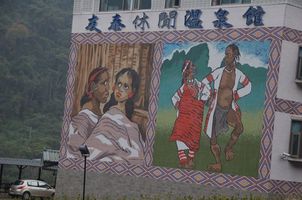
《山豬溫泉》,好看
撰文│許銘義 原文網址
出野外,調查溫泉,給某大財團蓋溫泉飯店前的購地建議。
接案者我以前職場上司,我當兩日助手。
最近練<返老還童>功,夜裡只有2-4點能入睡,中午至午後4點睡得很沈,根本就是日夜顛倒了啊。
所以雖沒在量測時爬上爬下,整個白天還是精神不濟,大多時沈默,旁觀組長與當地人攀談。
「以前中油就在這裡鑽過油氣井,聽說有鑽到溫泉過?」
「有啦,就在香菇寮那邊。」
好不容易終於撐到入宿警光山莊,一躺下便睡了兩個鐘頭,此後又因組長鼾聲而整夜無眠,不過第二日行程輕鬆已無精神負擔了。
警光山莊的溫泉是原湯,附近小民宿則從這邊接水過去。組長起床後又泡過一次,我對溫泉不是很感興致,只在入睡前用蓮蓬頭沖去身體灰塵。
半夜乾脆起身到走廊,瀏覽起牆上懸掛老照片。其中一張剪報寫著,日據時代稱為上島溫泉,蔣中正對此很感冒,直接下令易名泰安溫泉。
以前必須安排柴車前來,組長四十多年前來過,大三構造地質學野外,循河床沿路記錄露頭走了幾小時,一行二十多人睡大通鋪。
前一日邀了兩位外文系友人看電影,<山豬溫泉>。
故事場景在南橫的寶來溫泉,一家小民宿經八八風災後的心靈復健。播放途中我倒是不斷被拉回到三十年前去。一日室友賢達說了個暑假他參加測量隊打工趣事。
我們僱了三男一女出發,女孩子負責煮飯,另外一位山地青年非常開朗有趣,體格長相都像柯俊雄,經常在說〞我考警察的通知單不知來了沒?”
隊伍走在山谷兩側稜線上,聽見兩隊人馬大聲呼喊
-喂──,要不要去羅娜?
-你說什麼?
-要不要去羅娜─────
可能有教會活動或是布農族慶典,附近幾個部落將在羅娜聚會,但那還是很久之後的節日,兩隊人隔著縱谷吶喊,他們心中正滿溢喜慶的氣氛吧!
測量隊在進入中央山脈前投宿水里,一家非常老舊日式的旅舍,招僱來的揹夫是信義鄉的布農族青年,其中有一位很喜歡女中,見到她之後念念不忘說〞一定要跟她作愛〞。二十三歲的山地青年對一個暗中賣淫的婦人懷有浪漫期想,遲疑不敢有所行動,後來他終於成功,不知經誰指點用錢交易完成。問他滋味如何?他回答只敢摸摸她而已,而且很快被趕了出來。
電影裡只有純情,民宿老闆娘看著丈夫留下的錄影帶而逐漸走出喪夫之痛,女兒與靦腆青年的邂逅,山豬獵人對老闆娘的默默守候,等等。然而與賢達故事對比,卻在我心中產生一種難以言喻的焦躁。
看完電影繼續聊了一下,林是三十重聚系上的連絡人,回家後她傳了張照片來,我出現在其中。
「啊—,」我心底驚叫出來,「怎麼會有這個?」大學階段的我幾乎沒留下照片。
過於驚訝照片中六個女生我第一眼誰都沒認出來。
說是畢業公演,可我記憶中沒有絲毫印象,顯然並未觀看。照片中我還穿著運動褲,想是剛上過體育課,就這樣跑去跟一群端莊女學生合照,當年的我怎會厚顏若此啊!
第二天只需補拍幾張斷層露頭照片,可惜雨霧籠罩效果不佳。
即將離開部落時我請組長停車,搖下車窗拍了溫泉飯店牆壁,一幅原住民圖騰,其中少女不知因何噘起嘴來怒目回視。
心中立即響起 Jackson Browne 的歌 "Fountain of Sorrow".
I'm just one or two years and a couple of changes behind you
In my lessons at love's pain and heartache school
Where if you feel too free and you need something to remind you
There's this loneliness springing up from your life
Like a fountain from a pool.
電影真的好看。我慢慢品味起故事懸疑與轉折,原來都只為鋪陳一份深情,以及它能帶來的力量。那份焦躁感終於逐漸消失。原來時間披著嚴厲外衣只是假象,只當你看見人心的寬容一切便獲得轉機,不再是憂傷而是力量之湧泉。
撰文│許銘義 原文網址
出野外,調查溫泉,給某大財團蓋溫泉飯店前的購地建議。
接案者我以前職場上司,我當兩日助手。
最近練<返老還童>功,夜裡只有2-4點能入睡,中午至午後4點睡得很沈,根本就是日夜顛倒了啊。
所以雖沒在量測時爬上爬下,整個白天還是精神不濟,大多時沈默,旁觀組長與當地人攀談。
「以前中油就在這裡鑽過油氣井,聽說有鑽到溫泉過?」
「有啦,就在香菇寮那邊。」
好不容易終於撐到入宿警光山莊,一躺下便睡了兩個鐘頭,此後又因組長鼾聲而整夜無眠,不過第二日行程輕鬆已無精神負擔了。
警光山莊的溫泉是原湯,附近小民宿則從這邊接水過去。組長起床後又泡過一次,我對溫泉不是很感興致,只在入睡前用蓮蓬頭沖去身體灰塵。
半夜乾脆起身到走廊,瀏覽起牆上懸掛老照片。其中一張剪報寫著,日據時代稱為上島溫泉,蔣中正對此很感冒,直接下令易名泰安溫泉。
以前必須安排柴車前來,組長四十多年前來過,大三構造地質學野外,循河床沿路記錄露頭走了幾小時,一行二十多人睡大通鋪。
前一日邀了兩位外文系友人看電影,<山豬溫泉>。
故事場景在南橫的寶來溫泉,一家小民宿經八八風災後的心靈復健。播放途中我倒是不斷被拉回到三十年前去。一日室友賢達說了個暑假他參加測量隊打工趣事。
我們僱了三男一女出發,女孩子負責煮飯,另外一位山地青年非常開朗有趣,體格長相都像柯俊雄,經常在說〞我考警察的通知單不知來了沒?”
隊伍走在山谷兩側稜線上,聽見兩隊人馬大聲呼喊
-喂──,要不要去羅娜?
-你說什麼?
-要不要去羅娜─────
可能有教會活動或是布農族慶典,附近幾個部落將在羅娜聚會,但那還是很久之後的節日,兩隊人隔著縱谷吶喊,他們心中正滿溢喜慶的氣氛吧!
測量隊在進入中央山脈前投宿水里,一家非常老舊日式的旅舍,招僱來的揹夫是信義鄉的布農族青年,其中有一位很喜歡女中,見到她之後念念不忘說〞一定要跟她作愛〞。二十三歲的山地青年對一個暗中賣淫的婦人懷有浪漫期想,遲疑不敢有所行動,後來他終於成功,不知經誰指點用錢交易完成。問他滋味如何?他回答只敢摸摸她而已,而且很快被趕了出來。
電影裡只有純情,民宿老闆娘看著丈夫留下的錄影帶而逐漸走出喪夫之痛,女兒與靦腆青年的邂逅,山豬獵人對老闆娘的默默守候,等等。然而與賢達故事對比,卻在我心中產生一種難以言喻的焦躁。
看完電影繼續聊了一下,林是三十重聚系上的連絡人,回家後她傳了張照片來,我出現在其中。
「啊—,」我心底驚叫出來,「怎麼會有這個?」大學階段的我幾乎沒留下照片。
過於驚訝照片中六個女生我第一眼誰都沒認出來。
說是畢業公演,可我記憶中沒有絲毫印象,顯然並未觀看。照片中我還穿著運動褲,想是剛上過體育課,就這樣跑去跟一群端莊女學生合照,當年的我怎會厚顏若此啊!
第二天只需補拍幾張斷層露頭照片,可惜雨霧籠罩效果不佳。
即將離開部落時我請組長停車,搖下車窗拍了溫泉飯店牆壁,一幅原住民圖騰,其中少女不知因何噘起嘴來怒目回視。
心中立即響起 Jackson Browne 的歌 "Fountain of Sorrow".
I'm just one or two years and a couple of changes behind you
In my lessons at love's pain and heartache school
Where if you feel too free and you need something to remind you
There's this loneliness springing up from your life
Like a fountain from a pool.
電影真的好看。我慢慢品味起故事懸疑與轉折,原來都只為鋪陳一份深情,以及它能帶來的力量。那份焦躁感終於逐漸消失。原來時間披著嚴厲外衣只是假象,只當你看見人心的寬容一切便獲得轉機,不再是憂傷而是力量之湧泉。

